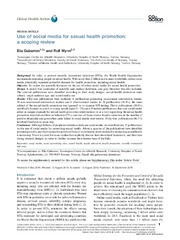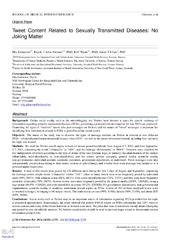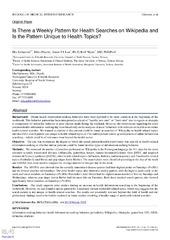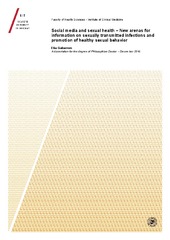| dc.contributor.advisor | Serrano, Artur J. | |
| dc.contributor.advisor | Wynn, Rolf | |
| dc.contributor.author | Gabarron, Elia | |
| dc.date.accessioned | 2017-07-05T13:10:12Z | |
| dc.date.available | 2017-07-05T13:10:12Z | |
| dc.date.issued | 2017-05-05 | |
| dc.description.abstract | Objectives: The objectives of this thesis are to investigate the use of social media for health promotion dealing with sexually transmitted infections, their value for improving health and increasing the promotion reach, and to provide examples on how social media users retrieve information about sexually- transmitted infections from these media. I want to investigate the nature of the information in a sample of messages that are shared on social media about sexually transmitted infections, the actors involved, and the patterns of online sexual health information-seeking. <br>Methods: The objectives were addressed in four separate studies, which used different methodologies: a scoping review, an intervention case study, and two observational studies. <br>Results: In the review it can be seen that the evidence supporting the use of social media for sexual health promotion is still insufficient. There are few publications with strong study designs using social media for this purpose, however, promising results regarding increasing promotion reach and improving health are found. The intervention case study is an example of how online social media can be used for promoting educational sites on sexual health. In one of the observational studies it can be seen how online social media users tweet about sexually transmitted infections, and that information posted online spreads rapidly, reaching a huge number of people. The other study shows that people search for information about sexually- transmitted infections, and that searches for this information on social media appears to follow a weekly pattern. <br>Conclusions: Although more studies of higher quality are needed before stronger claims can be made, the research literature and the results of the present investigation suggest that social media might be relevant resources for sexual health promotion and education purposes. The observation of behaviours on social media offers the possibility of identifying sexual health concerns, interests, misinformation, attitudes, or information-seeking patterns in an online community, with the possibility of using this information for subsequent health promotion purposes. The widespread acceptance of online social media, their potential for reaching a huge number of people in a very short time, and users’ interest in sexual health topics, suggest that these networks can be valuable in promoting sexual health. | en_US |
| dc.description.doctoraltype | ph.d. | en_US |
| dc.description.popularabstract | Several hundred million people contract sexually transmitted infections every year worldwide. Especially young people are at great risk of infection. Social media has already surpassed two billion users. Its large coverage gives potential for reaching a huge amount of population in a very short time and thus make these networks valued spaces to promote sexual health. However, we do not know if the use of social media for sexual health promotion could result in better health outcomes. Reviews analysing the effect of health promotion interventions delivered through social media have reported small and moderate effects on behaviour change while pilot studies show positive effects on self-reported outcomes.
To increase knowledge on how sexual health is promoted through social media, Elia Gabarron reviewed publications from academics and non-governmental organisations. She found that around 25 percent of the studies have positive findings. However better study designs are needed. In addition, Gabarron is presenting a case study where she used social media to promote sexual health among North-Norwegian youngsters. Two observational studies showed that people have an interest for sexual health topics, they discuss it in the social media, and they search for information in these medias at specific moments. Sexual health promotion studies with stronger study designs, delivered through the precise social media channel, and during the appropriate moment, will show all the benefits that these media can have on health promotion. | en_US |
| dc.description.sponsorship | This PhD was supported by a grant from Helse Nord (grant numbers HST1023-11 and HST1184-14). | en_US |
| dc.description | The paper 2 of this thesis is not available in Munin. <br>
Paper 2: Gabarron, E., Fernández-Luque, L., Schopf, T., Lau, A. Y. S., Armayones, M., Wynn, R., Serrano, J. A.:” Impact of Facebook ads for sexual health promotion via an educational web app: A case study”. (Manuscript). Published version available in <a href=10.4018/IJEHMC.2017040102> : International Journal of E-Health and Medical Communications 2017, 8(2). </a> | en_US |
| dc.identifier.uri | https://hdl.handle.net/10037/11236 | |
| dc.language.iso | eng | en_US |
| dc.publisher | UiT The Arctic University of Norway | en_US |
| dc.publisher | UiT Norges arktiske universitet | en_US |
| dc.rights.accessRights | openAccess | en_US |
| dc.rights.holder | Copyright 2017 The Author(s) | |
| dc.subject.courseID | DOKTOR-003 | |
| dc.subject | VDP::Medical disciplines: 700::Health sciences: 800::Other health science disciplines: 829 | en_US |
| dc.subject | VDP::Medisinske Fag: 700::Helsefag: 800::Andre helsefag: 829 | en_US |
| dc.subject | VDP::Medical disciplines: 700::Health sciences: 800::Preventive medicine: 804 | en_US |
| dc.subject | VDP::Medisinske Fag: 700::Helsefag: 800::Forebyggende medisin: 804 | en_US |
| dc.title | Social media and sexual health – New arenas for information on sexually transmitted infections and promotion of healthy sexual behavior | en_US |
| dc.type | Doctoral thesis | en_US |
| dc.type | Doktorgradsavhandling | en_US |


 English
English norsk
norsk


